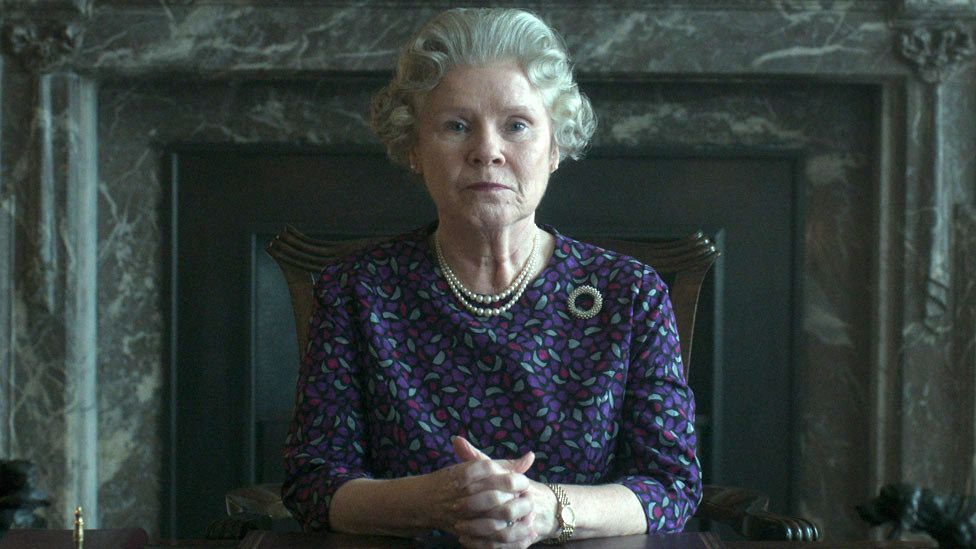ARTICLE AD BOX
 Image source, Netflix
Image source, Netflix
Imelda Staunton is the third actress to play Queen Elizabeth II in The Crown
By Charlotte Gallagher & Guy Lambert
Culture reporters, BBC News
From the coronation of Queen Elizabeth II to the aftermath of the death of Princess Diana, Netflix's The Crown has depicted five decades of the Royal Family's highs and lows.
Throughout the heart of the series has been the relationship between the late Queen and Princess Margaret.
The Crown stars Imelda Staunton and Lesley Manville tell the BBC it was a "special" experience playing the royal sisters - but a "shock" when the Queen died while they were filming the final series.
Image source, PA Media
Image caption,The Crown has explored Princess Margaret and Queen Elizabeth's relationship during its seven-year run
The Crown began in 2016 by dramatising the death of Elizabeth and Margaret's father, King George VI.
Since then, the show has won dozens of awards and attracted millions of viewers worldwide.
But as time has gone on, it has divided critics and viewers, with some accusing it of historical inaccuracy in its portrayal of private royal life and sensitive events.
Last year, it was described by one of the Queen's friends as "complete fantasy", while Dame Judi Dench accused the show of "crude sensationalism" and joined calls for a disclaimer to make clear the series is not necessarily true.
The first part of the sixth and final series, covering the events surrounding Diana's death in 1997, was released in November.
The final six episodes will be released on Netflix on 14 December and will address the death of Princess Margaret in 2002, before introducing the relationship between William and Kate, now the Prince and Princess of Wales.
Image source, Netflix
Image caption,Season six part two will explore the early days of William and Kate's relationship
Staunton is the third actress to play the Queen, following Claire Foy and Olivia Colman.
Meanwhile, Princess Margaret has been portrayed by Vanessa Kirby and Helena Bonham Carter before Manville.
"It is lovely for us to conclude this relationship from the very first series to this one," Staunton says. "For Elizabeth, the touchstone of Margaret was very important."
Manville adds that the sisters were "probably one of the greatest loves of each others' lives".
Margaret 'more than a cliché'
Margaret was known as a party girl, with her romances and luxurious lifestyle well documented by the newspapers.
For Manville, the main challenge was to make her more than just that public perception.
"It is very easy to draw a very bold thumbnail sketch of Margaret and you can make her a cliché," the Oscar-nominated actress says.
"But of course that is never what someone is. There is always so much more that is making them tick."
She adds that "there was definitely a sadness and loneliness" that punctuated Margaret's life.
Image source, Netflix
Image caption,Lesley Manville is the third actress to play Princess Margaret
Things took an unexpected turn for the actresses during the filming for the final series last year, when it was announced that the Queen had died.
"It was a very strange day," Manville recalls. "We were doing a scene together, just the two of us all day."
"It was really shocking," adds Staunton, who previously sang at the Queen's 90th Birthday Pageant in 2016. "More shocking for me than I thought I would feel."
By chance, Staunton had 10 days off work during the period of mourning. But when she returned to work, things felt different.
It was "more difficult for people looking at me" when she was dressed as the Queen, she says.
Image source, Netflix
Image caption,Imelda Staunton as Queen Elizabeth II and Jonathan Pryce as the Duke of Edinburgh
She adds that "playing someone whose whole life has been about duty" gave her an understanding of why the public queued in their masses when the monarch died.
"I think of lot people were saying, 'You went to work every day single day of your life and you didn't call in sick'.
"I think people were just saying, 'Thank you for turning up every single day'."
'Shouldn't stop us telling their stories'
The series is coming to it conclusion after seven years and 60 episodes. "To be a part of that is really special," Staunton says.
"To have this story going on with three casts, three different ages - I don't know if it will ever be done again."
Despite The Crown reaching it's final chapter, the Royal Family's story will "continue to be told for many years", she says.
"Historically we all like stories about the Tudors and Henry VIII. It'll always be told because they are fascinating characters.
"It is a world we have to imagine because we are not in it. It doesn't stop people telling the stories, and nor should it."

 1 year ago
68
1 year ago
68








 English (US) ·
English (US) ·